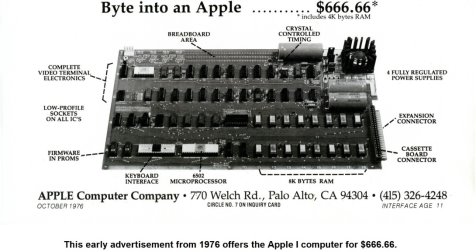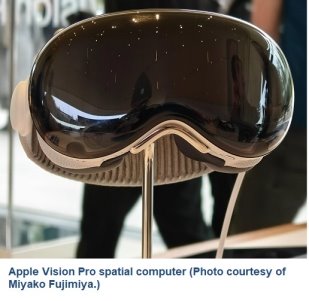Volume 43 Issue Three March 2024
Last Trumpet Ministries · PO Box 806 · Beaver Dam, WI 53916
Phone: 920-887-2626 Internet: http://www.lasttrumpetministries.org
“For if the trumpet give an uncertain sound, who shall prepare himself to the battle?” I Cor. 14:8
The Pursuit Of Knowledge
“Now the serpent was more subtil than any beast of the field which the LORD God had made. And he said unto the woman, Yea, hath God said, Ye shall not eat of every tree of the garden? And the woman said unto the serpent, We may eat of the fruit of the trees of the garden: But of the fruit of the tree which is in the midst of the garden, God hath said, Ye shall not eat of it, neither shall ye touch it, lest ye die. And the serpent said unto the woman, Ye shall not surely die: For God doth know that in the day ye eat thereof, then your eyes shall be opened, and ye shall be as gods, knowing good and evil.”
Genesis 3:1-5
In the first book of the Holy Bible, we find a story about the origin of sin and the fall of man. The story, recorded in Genesis, chapter 3, reveals how a serpent beguiled the first human beings, Adam and Eve. The serpent first enticed Eve to eat the forbidden fruit of the Tree of Knowledge with the promise that her eyes would be opened and she would know “good and evil” for doing so. Eve then gave the fruit to Adam, and he, too, gave in to temptation. Perhaps the most tragic detail of this story is the fact that both Adam and Eve already had the knowledge of good. Genesis 1:31 tells us, “And God saw every thing that he had made, and, behold, it was very good. And the evening and the morning were the sixth day.” Thus, everything in the Garden of Eden was good, and everything that Adam and Eve knew and experienced on a daily basis was good. The only knowledge to be gained by eating the forbidden fruit was the knowledge of evil.
A lot has changed since those ancient days. One thing that has remained constant, however, is mankind’s voracious appetite for knowledge. The knowledge acquired over millennia has changed the world for better or worse depending on your perspective.
A Century Of Innovation
The world was very different a century ago. Radio was still a young technology, and although the incandescent light bulb was developed in the late 1800s, only about half of all American households had electricity in 1925. (1) Even as electricity became more widely available, the very first television was demonstrated by a young inventor named Philo Taylor Farnsworth in San Francisco, California, on September 7, 1927. (2) The United States is about 247 years old. Thus, this land of opportunity that the American people call home existed without these amazing inventions longer than it has existed with them.
Although radio and television very much changed the world, no modern innovation has had a more profound role in transforming society than the computer. What is truly remarkable, however, is how much computers have advanced over the last eighty years. In February 1946, the first general-purpose electronic computer was put into service by the United States military. Known as the Electronic Numerical Integrator and Computer, or ENIAC, this massive machine occupied a room measuring 30 by 50 feet. The machine had 70,000 resistors, 10,000 capacitors, and 500,000 soldered joints. It weighed an astonishing 30 tons. (3)

By the 1970s, computers existed that were small enough to fit on a desk. In 1973, Xerox built the first computer with removable storage, a graphical user interface, and a mouse. Known as the Xerox Alto, the machine was never sold to consumers, (4) but one of the computers was placed in the Oval Office of the White House in 1978 at the behest of former President Jimmy Carter. (5) The features of the Xerox Alto would inspire the design of one of the most famous computers ever made – the Apple Macintosh.

Steve Jobs and Steve Wozniak founded Apple Computer Company in 1976. Their first product, known as the Apple-I computer, sold at a retail price of $666.66. (6) The following year in 1977 Apple released the Apple-II computer. This machine was the first to bear what would become one of the most iconic logos in history, an apple with a distinctive bite mark. (7)

It is often believed that the forbidden fruit consumed by Adam and Eve in the Garden of Eden was an apple. Although the Bible never specifically says the fruit was an apple, the association is there by tradition, and one cannot help but wonder if the logo represents man’s quest for the knowledge of good and evil. When the logo’s designer, Rob Janoff, was asked why the apple has a bite mark, he claimed this was done so users would not think the image is a cherry. However, he also suggested that the story of the forbidden fruit also played a role in the design. "When I explain the real reason why I did the bite it's kind of a letdown. But I'll tell you. I designed it with a bite for scale, so people get that it was an apple not a cherry. Also, it was kind of iconic about taking a bite out of an apple," Janoff explained. (8)
Most of us use modern technology every day. While it is a useful tool that allows us to learn and communicate, we should be cognizant of the fact that the advanced devices and technology of today will no doubt play a pivotal role in our adversary’s plan to bring about a global antichrist system. Indeed, the entire world is undergoing a dramatic tech-driven transformation as technologies that resemble the science fiction of yesteryear become the reality of today.
Is This The Future?
One of the side effects of living in an increasingly digital world is the attachments we form to our devices. For example, the ubiquitous nature of smartphones has led to a phenomenon that scientists refer to as “smartphone separation anxiety,” or “nomophobia.” According to a piece published by Psychology Today in 2020, nomophobia is defined as “a fear or anxiety of not having a mobile device or not having access to a mobile device when it’s needed. It has also been more broadly described as the fear of feeling disconnected from the digital world.” (9) According to a report published by PC Magazine in May 2023, people check their phones, on average, 144 times per day. (10) The article also reports that 89 percent of Americans check their phones within the first ten minutes of waking, 75 percent feel uneasy leaving their phones at home, and 47 percent feel a sense of panic or anxiety when their cell phone batteries go below 20 percent. (11) Without a doubt, the population at large is increasingly immersed in technology, but in the coming years, many people may become more attached to their devices than ever before. In fact, people are already beginning to wear computers on their heads.
On February 2, 2024, Apple launched its newest product, a “spatial computer” known as the Apple Vision Pro. According to a press release from Apple, the device “seamlessly blends digital content with the physical world and unlocks powerful spatial experiences in visionOS, controlled by the most natural and intuitive inputs possible — a user’s eyes, hands, and voice.” (12) In other words, this sophisticated headset, which the user wears like a pair of goggles over the eyes, can display a computer environment mixed with one’s surroundings. Influencers on YouTube who tried the expensive new wearable computer were quite impressed with its performance. “It’s an imperfect product, but to me, at age 42, this is without a doubt the most profound piece of technology I have ever experienced, and that was not my expectation,” said Casey Neistat, a YouTuber with 12.6 million subscribers. He later went on to say, “In my life, I’ve never experienced something that is such a quantum leap in technology as the Vision Pro.” (13)

In a review published by CNBC on January 30, 2024, writer Todd Haselton was also quite impressed with the device. “It’s easily the most fun I’ve had with a new product in years,” he wrote. He further commented, “I’m convinced that if Apple eventually sells cheaper versions, we’ll see millions of people using them in the coming years.” Finally he gushed, “This is an entirely new type of computing, providing a whole new world of experiences. It feels like the future.” (14)
Could millions of people someday walk around with spatial computers mounted on their heads? If this does indeed come to pass, we are in for a very strange future. Aside from the oddness of seeing people wearing computers and making peculiar gestures, are there any dangers to using the Vision Pro and other mixed reality devices?
It should be noted that people's view of the outside world when they use the Vision Pro isn’t the real thing. It’s a high quality video image of the outside world that is then mixed with a virtual environment. As such, the device can warp the user’s sense of reality. A recent study conducted by Stanford University suggests that excessive use of this new type of computer can rewire the human brain. “Even though the world you are looking at is real, it certainly has a video-game-like ‘otherness’ to it,” said one of the study’s co-authors, James Brown. (15) Thus, even though you can see people around you when you wear the headset, they feel like characters in a video game rather than real people.
The study further reported that prolonged use of mixed reality headsets produced a slew of side effects. Users had trouble performing simple tasks such as pressing an elevator button or putting food in their mouths. All eleven people who participated in Stanford’s field tests reported bouts of “simulator sickness” with symptoms such as eye strain, nausea, dizziness, and headaches. (16)
Perhaps the biggest danger that the Vision Pro presents is addiction. Addiction to our devices with screens is already widespread. What if people decide they prefer to spend the majority of their time in a mixed reality environment instead of the real world? Interestingly enough, a piece published by Fortune Magazine on January 18, 2024, suggests that the Vision Pro will be able to give doctors and teachers a “superpower.” (17) Given the immersive nature of mixed reality devices, though, using a Vision Pro for prolonged periods of time is akin to surrendering our minds to Apple.
Perhaps the Vision Pro will remain a niche product or fade into obscurity over time. The biggest impediment to widespread adoption is the price tag. With a retail price of $3,500, the Vision Pro is not a device that the average American family could easily afford. Nevertheless, whether you call it mixed reality, augmented reality, or spatial computing, how we see and experience the world could dramatically change in the not-too-distant future.
Getting Into Your Head
Apple is not the only tech company looking to alter the human perception of reality. Eccentric billionaire Elon Musk, who runs a group of companies including SpaceX, Tesla Motors, and X (formerly Twitter), also owns a company called Neuralink, which is hard at work perfecting a “brain computer interface.” This interface, which comes in the form of a microchip that is implanted in the brain, has been in development for years but had never been implanted in a human test subject until January 2024. On February 19, 2024, Musk offered a brief update on their first human test subject. "Progress is good, and the patient seems to have made a full recovery, with no ill effects that we are aware of. Patient is able to move a mouse around the screen by just thinking," Musk wrote. (18)
The secrecy surrounding the project has alarmed doctors. “[Neuralink is] only sharing the bits that they want us to know about. There’s a lot of concern in the community about that,” said Sameer Sheth, a neurosurgeon at the Baylor College of Medicine. (19) A brief critique from The Hastings Center also lambasted Musk’s handling of the matter. “Opening up the brain of a living human being to insert a device, particularly someone with serious medical problems, deserves more than a two-sentence report on what is, in effect, a proprietary social media platform not distinguished for its reliability where facts are concerned. This human research subject, their family, all potential future research subjects and patients, the medical community, and all of us deserve more,” the authors wrote. (20) Considering that Neuralink was under a federal investigation in December 2022 for causing the deaths of about 1,500 animals during research and testing, (21) concern for the first human test subject is undoubtedly warranted.
Musk has outlined grandiose plans for the Neuralink chip in previous statements. While other companies that produce brain chips tout their products as a way for users to overcome paralysis and motor function loss, Musk envisions his chip as a means for human beings to keep up with artificial intelligence. “Even in a benign AI scenario, we will be left behind. With a high-bandwidth brain-machine interface, we can actually go along for the ride. We can have the option of merging with AI,” Musk boasted in 2019. (22) In 2023, Musk suggested his chip could be used to treat conditions such as depression and morbid obesity. “I think you can solve a very wide range of brain injuries, including severe depression, morbid obesity, sleep [disorders and] restoring memory in older people.” (23) Of course, this level of brain manipulation goes beyond helping a paralyzed person restore lost functions. Such manipulations would alter people’s thoughts and behavior.
To be sure, Elon Musk is not a man of typical ambitions. In a piece published by the New York Times, the iconic newspaper accused Musk of having a savior complex. “SpaceX is to make humans a multiplanetary species, so we can escape to Mars if something apocalyptic happens to earth. Tesla’s mission is to move humanity past a hydrocarbon economy toward a sustainable future. His new firm xAI is there to help prevent artificial intelligence from taking over the world. Neuralink, which embeds technology into people’s brains, is there to help the blind see and the paralyzed walk. You can’t get more savior-like than that,” the piece declares. (24) Yet, if Musk fancies himself a savior, his services are not needed. I only have one Lord and Saviour, and He is Jesus Christ. The position has not been vacated, nor will it ever be. Needless to say, I will never take the Neuralink chip.
Interestingly enough, Neuralink may soon have competition from China. In 2023, a 60-person laboratory was opened in China. It’s sole purpose is the development of brain-machine interfaces. In a press release from January 2024, China’s Ministry of Industry and Information Technology announced plans to “make breakthroughs in key technologies and core devices such as brain-computer fusion, brain-like chips, and brain-computing neural models.” The first products could become available in 2025. (25)
Knowledge Is Power
The saying, “knowledge is power” is often attributed to Sir Francis Bacon. Thomas Jefferson, the third President of the United States, was also known to be fond of this statement. Thus, it is easy to see why humanity has exerted so much effort into acquiring more knowledge. When the computer was invented, it enabled humanity to learn more efficiently than ever before. After that, the Internet came along with seemingly endless amounts of human thought scrawled out on the digital pages of the World Wide Web. The development of the Internet has given users unprecedented access to information and disinformation, too. Now we see new technologies emerging that go beyond anything our forefathers could have conceived in their minds.
In recent months, there has been a lot of talk about generative AI featured in such applications as OpenAI’s ChatGPT. Interestingly enough, a collaborative piece written by Henry Kissinger (now deceased), former Google CEO Eric Schmidt, and dean of the Schwarzman College of Computing at the Massachusetts Institute of Technology Daniel Huttenlocher was published on February 24, 2023, by the Wall Street Journal. The piece, which is entitled “ChatGPT Heralds an Intellectual Revolution,” goes on to surmise, “As its capacities become broader, they will redefine human knowledge, accelerate changes in the fabric of our reality, and reorganize politics and society.” The article later goes on to state, “Machine-learning systems have already exceeded any one human’s knowledge. In limited cases, they have exceeded humanity’s knowledge, transcending the bounds of what we have considered knowable.” (26)
The biggest tech companies in the world are jockeying for positions to lead the realm of artificial intelligence. Microsoft, which has long been one of the wealthiest companies in the world, recently became only the second company in history to be valued at three trillion dollars. This monumental period of growth was sparked by the company’s early investments in AI. (27) The only other company to ever reach three trillion dollars in value is none other than Apple Inc. (28)
In truth, the knowledge of artificial intelligence, which is often faulty and deceptive, will never be able to equal or surpass the matchless wisdom, knowledge, and understanding of God. In Romans 11:33-36, we find these inspiring words, “O the depth of the riches both of the wisdom and knowledge of God! how unsearchable are his judgments, and his ways past finding out! For who hath known the mind of the Lord? or who hath been his counsellor? Or who hath first given to him, and it shall be recompensed unto him again? For of him, and through him, and to him, are all things: to whom be glory for ever. Amen.” You can find the most essential knowledge ever revealed to humanity written on the pages of God’s Word. If you have not yet repented of your sins and dedicated your life to God, I urge you to do so now.
Thank you all for your continued support of this ministry. It is our hope and prayer that God will bless you all. If you have any prayer requests, great or small, we again invite you to send them our way. Our team of intercessors gives each request individual attention. The grace of our Lord Jesus Christ be with you all. Amen.
Samuel David Meyer
This newsletter is made possible by the kind donations of our supporters. If you would like to help us, you may send your contribution to our postal address or donate online at http://lasttrumpetnewsletter.org/donate.
Acknowledgments
01. National Park Service, December 21, 2023, nps.gov.
02. New York University, By Mitchell Stephens, stephens.hosting.nyu.edu.
03. University of Pennsylvania, seas.upenn.edu.
04. ToastyTech, toastytech.com.
05. Midland Daily News, May 26, 2016, By Midland Daily News, ourmidland.com.
06. BBC News, November 15, 2007, By BBC News, bbc.co.uk.
07. Slashgear, July 3, 2022, By Dave McQuilling, slashgear.com.
08. Ibid.
09. Psychology Today, February 4, 2020, Reviewed By Daniel Lyons, M.A., psychologytoday.com.
10. PC Magazine, May 19, 2023, By Emily Dreibelbis, pcmag.com.
11. Ibid.
12. Apple Newsroom, February 2, 2024, By Apple Newsroom, apple.com.
13. NBC News, February 5, 2024, By Kalhan Rosenblatt, nbcnews.com.
14. CNBC, January 30, 2024, By Todd Haselton, cnbc.com.
15. StudyFinds, February 6, 2024, By StudyFinds Staff, studyfinds.org.
16. Stanford University, February 2, 2024, By Jeremy N Bailenson, Brian Beams, James Brown, Cyan DeVeaux, Eugy Han, Anna C. M. Queiroz, Rabindra Ratan, Monique Santoso, Tara Srirangarajan, Yujie Tao, and Portia Wang, vhil.stanford.edu.
17. Fortune, January 18, 2024, By Mark Gurman and Bloomberg, fortune.com.
18. Reuters News Service, February 20, 2024, By Kanjyik Ghosh, reuters.com.
19. Quartz, February 26, 2024, By Bradley Brownell, qz.com.
20. The Hastings Center, February 12, 2024, By Arthur Caplan and Jonathan D. Moreno, thehastingscenter.org.
21. Reuters News Service, December 6, 2022, By Rachael Levy, reuters.com.
22. Wired, July 17, 2019, By Adam Rogers, wired.com.
23. The Daily Beast, December 24, 2023, By David Axe, thedailybeast.com.
24. The New York Times, September 21, 2023, By David Brooks, nytimes.com.
25. Quartz, January 30, 2024, By Maxwell Zeff, qz.com.
26. The Wall Street Journal, February 24, 2024, By Henry Kissinger, Eric Schmidt, and Daniel Huttenlocher.
27. CNN Business, January 24, 2024, By Nicole Goodkind and Elisabeth Buchwald, cnn.com.
28. Ibid.
Source
No comments:
Post a Comment